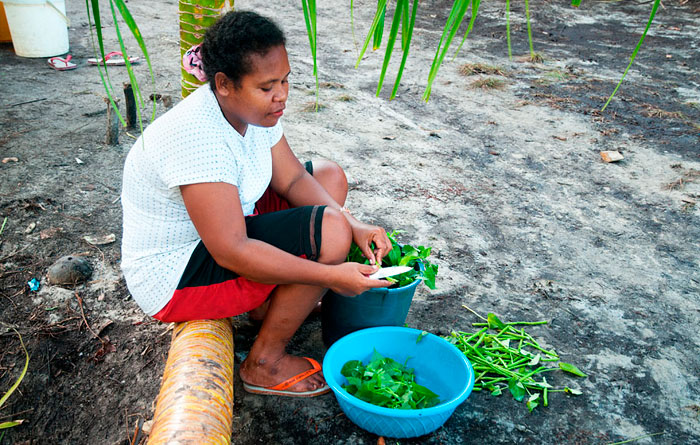All Raja Ampat homestays prices are for full board: Three meals a day are included in your accommodation price.
Vegan and vegetarian meals are available at all homestays. Just let your hosts know of your requirements when you meet.
If you have a serious a food allergy of any kind, then you might want to reconsider staying at a homestay. Rapid response medical care is unavailable in Raja Ampat, and communicating the nature and seriousness of any allergy to all kitchen staff could be difficult.
Food
Don’t expect to be able to choose from a restaurant style menu at homestays. With some exceptions, meals are basic and usually repetitive in nature. Meals are almost always slightly westernised versions of traditional Raja Ampat fare.
Breakfast is the meal that most guests find least satisfying. Breakfasts at most homestays are the same as local people eat and are most often fried. Bananas, plantains or yams, and the local version of the doughnut (some of which can be exceptionally delicious) are commonly served.
Midday meals might be rice based with perhaps some chicken or fish, maybe in a soup. Tempeh and tofu figure occasionally at some homestays.
Evening meals are usually larger versions of lunch with freshly cooked fish and/or chicken and rice meals served with local vegetables. Desserts of fruit in season or sweet dumplings might also be served.
Fish – always fresh and delicious – naturally features large in the Raja Ampat menu and can be served in a variety of ways.
Papua has no tradition of widespread cultivation of fruit, so – surprisingly for many – fresh tropical fruit (with the exception of banana) is not widely available.
If you’re vegetarian or vegan, consider bringing some of your favourite protein in case local tempeh and tofu supplies are low.
If you have other special dietary requirements or want something more than local cuisine your only choice is to bring the ingredients with you or to visit one of the resort restaurants.
With the probable exception of the busier establishments, it’s possible to cook for yourself using the homestay kitchen if you really want to take control. You’ll need to be adept at cooking over an open fire or on kerosene stoves though…
If you want to know more about traditional food in the islands see our Raja Ampat local culture page.
Drinks
Tea, coffee and drinking water are supplied free of charge around the clock at most homestays.
Due to the previously mentioned lack of fruit, fresh fruit juices are almost impossible to come by, as is alcohol.
Beer is the only alcohol that can easily purchased in Raja Ampat, but homestays are not licenced to sell it, and it is not widely available. Waisai, a local shop in Sawinggrai on Gam and a shop on Arborek are the only places we’ve discovered so far that always have it available. If a daily beer is essential, then it’s best to purchase a supply before you leave Waisai.
Wine and spirits are available for sale in Sorong, but the range is limited, and Indonesian customs duty makes imported alcohol very expensive. It’s probably best to bring those with you if you want them. (You’re permitted to import 1 litre per person.)
Various canned and bottled drinks (mainly of the carbonated variety) are available in small village shops, but are usually sold warm due to a lack of constant electricity supply to run refrigerators.
For more about drinking water – and why you shouldn’t resort to bottled water – see the Raja Ampat drinking water page.
Halal Food in Raja Ampat
The culture of the northern Raja Ampat islands is predominantly Christian, so certified halal food is almost impossible to find outside the larger towns. Certified halal food is easy to find in Sorong and is also available in Waisai, but once you’re out in the islands proper halal food is non-existent as far as we know. Homestays will, however, always do their best to serve halal food when asked to.
Bottom line on Raja Ampat homestay food and drink?
If you can’t bear to be without it, bring it with you!
(But don’t trash paradise – be sure to take any packaging home with you. See this article about the problem of rubbish disposal in Raja Ampat.)
